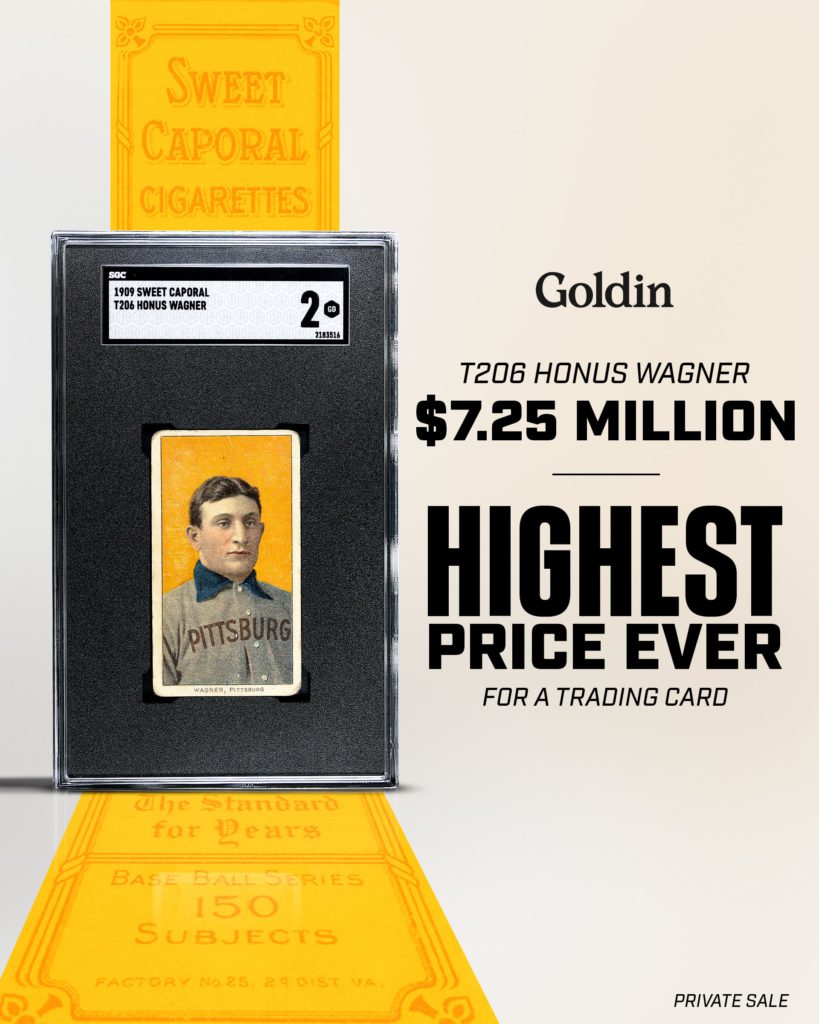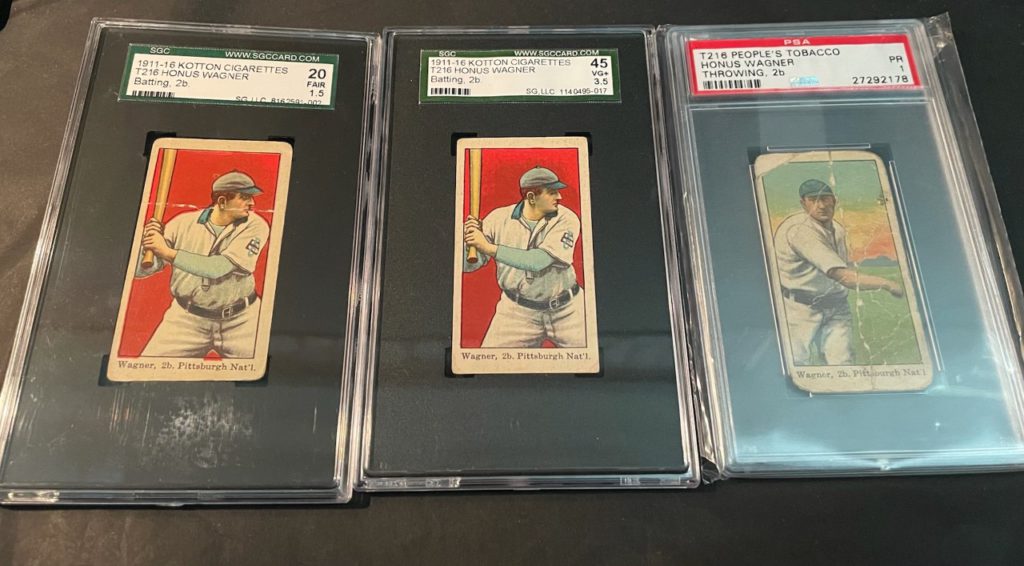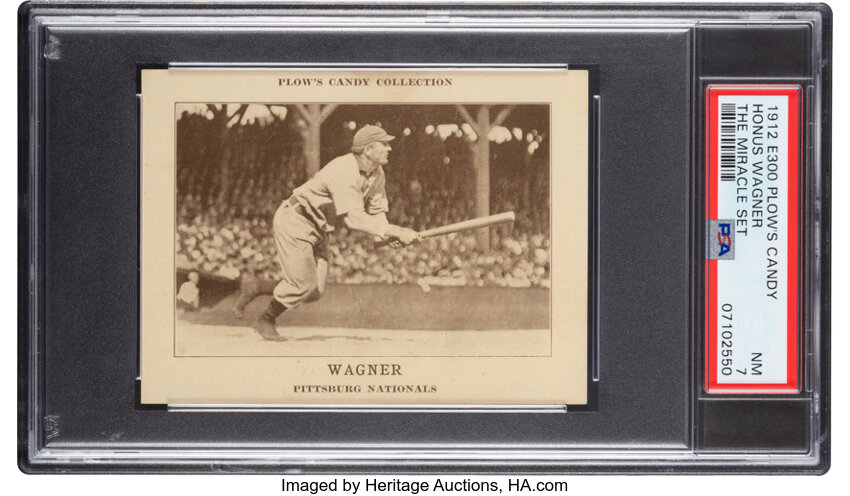Records are meant to be broken, and this is becoming more and more of the case each year in high-end sports collectibles. An announcement has been made by Goldin that a prized T206 Honus Wagner from 1909 has set a new private sale transaction record at $7.25 million. The news of this card sale is in the wake of the 2022 National Sports Collectors Convention and the card’s grade is shown as an SGC 2 grade.

The last high-profile T206 Honus Wagner sale was the Charlie Sheen All-Star Cafe Honus Wagner which was last covered on April 1, 2022. After 45 bids and a minimum $300,000 bid, the final price through Mile High Card Co. was $3,136,500.00. That example was a mere PSA 1 and it had some incredible provenance and history behind the card.
This latest SGC 2 Wagner was the highest private transaction of a sports card, but the current “Finest Known Example” of the 1952 Topps Mickey Mantle that is up for auction by Heritage Auctions is already a step above this for an all-time auction record. The card is being represented with an estimate of $10 million or more, and the last bid of $6.05 million was actually a price of $7.26 million after Heritage’s buyer’s premium.
How Scarce is the T206 Honus Wagner?
One interesting aspect about the T206 Honus Wagner is that there is just not an agreed to number on how many examples exist. Some estimates were that 60 to 70 examples in any condition exist. Others state 50 to 60 known examples. And some put the number closer to 60 cards. Here is what we know — the population report from PSA shows only 36 graded examples, and the SGC population reports show only 17 graded examples with the Sweet Caporal back. And Beckett’s population report counts 1 graded example.
What is not known is how many ungraded examples of this T206 Honus Wagner are in existence. There is a Wagner strip that was found in some of Wagner’s own clothing after his death. The website Post War Cards has also given a run down about how many unknown examples of this card exist. All in all, that is 54 known examples plus the potential examples, and we also have to default to the inconsistencies of populations that have been tracked over the last 20 years or more.
So what does this sale really mean for the hobby of sports collectibles?
One answer to consider is that the high-end and most desirable sports collectibles and most desirable sports cards are attracting new buyers as an alternative asset class. This has already been happening with fine art, historical documents, classic cars and so on. So why not sports cards? Collectors Dashboard evaluates high-end collectibles as an alternative asset class. That definitely includes sports collectibles, which also means Honus Wagner.
There is an ongoing debate over whether the American Tobacco had to withdraw the Honus Wagner cards from its printing over a contract dispute or whether Honus didn’t want his image being used to sell tobacco to kids. This debate rages on.
There are other Honus Wagner tobacco cards more scarce than the T206 Wagner!
One such “more rare tobacco Honus Wagner” card is the T216 Honus Wagner issued from 1911 to 1916 by the Peoples Tobacco Company in New Orleans. Whether or not Honus even knew about this card is a mystery, and Peoples failed as a business almost as fast as it started. The tobacco company used the same images from some “E” caramel cards which were also used elsewhere and there are 4 variations (two batting and two throwing, with s.s. and 2b position variations). The PSA population is only 22 graded cards in any condition and SGC’s population report has a total of 21 cards Honus Wagner cards graded — making just 43 known graded examples between the top grading destinations. (And for disclosure purposes, these 3 Wagners in the image below are mine)

Goldin Auctions previously confirmed that there are fewer T216 Honus Wagner cards than there are T206 cards, but they also noted the issue that these may have been made without knowledge or permission. A PSA 3 example sold for $12,250 several years ago and here is what Goldin had to say at the time:
Of additional significance, this tobacco card silently disputes the idea that the T206 Wagner card’s rarity derives from the great player’s objection to his likeness accompanying a tobacco product. (On the other side of the coin, Peoples Tobacco was a tiny company and the cards were issued solely in and around Louisiana; Wagner’s permission may not have been obtained prior to the cards’ production, and it’s possible that he was completely unaware of their existence.)
And What’s The Most Scarce Honus Wagner Card?
The most scarce Honus Wagner card we have seen come to auction in recent years is from the 1912 E300 Plow’s Candy set. Heritage Auctions listed this card as both the highest-graded example and the only known example to exist (image below by Heritage Auctions). That puts its scarcity far higher than the T206, and the PSA 7 is better than the graded T206 Wagners that usually come to auction in poor condition. Heritage’s Guide value or estimate was “$300,000 – up” and it sold for $312,000 (including buyer’s premium) after bids. Most collectors have never seen an example from this scarce set and the background on this set and the Ty Cobb card that came up also is worth a read.

The End-Game in High End Sports Collectibles…
There is an end-game in sports collectibles that simply should not be ignored here. The extremely scarce and highest graded examples of the best players’ cards remain in high demand and are still commanding higher and higher prices with nearly every auction. There are still some disappointing auctions from time to time on these ultra high-end items, but the best graded cards of Honus Wagner, Mickey Mantle, Hank Aaron, Ty Cobb, Jackie Robinson, Willie Mays and others can command ultra high prices that go into the hundreds of thousands of dollars or into the millions of dollars.
The year 2022 is likely the year that the first $10 million sports card will be sold. That’s saying something solid — and it isn’t just that boys’ shoeboxes may have some valuable baseball cards in them.


